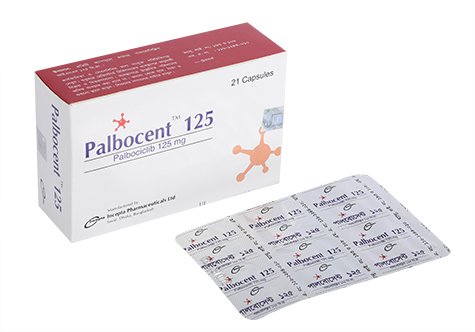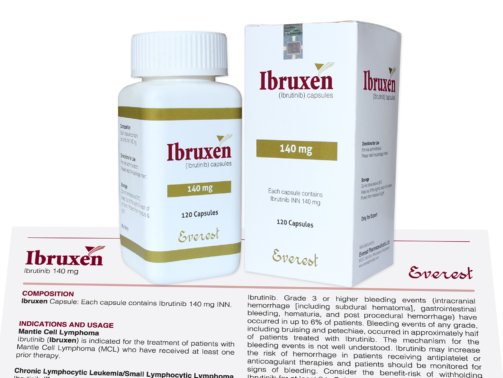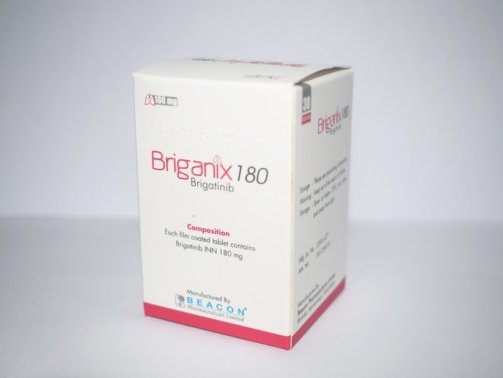Palbociclib 125 mg (Ibrance)
0.00$
Palbociclib is an inhibitor of cyclin-dependent kinases (CDK) 4 and 6. Cyclin D1 and CDK4/6 are downstream of signaling pathways which lead to cellular proliferation. In vitro, Palbociclib reduced cellular proliferation of estrogen receptor (ER)-positive breast cancer cell lines by blocking progression of the cell from G1 into the S phase of the cell cycle. Treatment of breast cancer cell lines with the combination of Palbociclib and antiestrogens leads to decreased retinoblastoma (Rb) protein phosphorylation resulting in reduced E2F expression and signaling, and increased growth arrest compared to treatment with each drug alone. In vitro treatment of ER-positive breast cancer cell lines with the combination of Palbociclib and antiestrogens led to increased cell senescence compared to each drug alone, which was sustained for up to 6 days following Palbociclib removal and was greater if antiestrogen treatment was continued. In vivo studies using a patient-derived ER-positive breast cancer xenograft model demonstrated that the combination of Palbociclib and letrozole increased the inhibitionof Rb phosphorylation, downstream signaling, and tumor growth compared to each drug alone. Human bone marrow mononuclear cells treated with Palbociclib in the presence or absence of an anti-estrogen in vitro did not become senescent and resumed proliferation following Palbociclib withdrawal.
A drug called palbociclib, marketed under the name Ibrance, is essential for treating some forms of breast cancer, especially when the disease is hormone receptor-positive (HR+) and human epidermal growth factor receptor 2-negative (HER2-). Ibrance is a member of the CDK 4/6 inhibitor medication class, which primarily inhibits the activity of cyclin-dependent kinases 4 and 6, which are essential for the proliferation of cancer cells. Palbociclib can halt or even reverse the growth of cancer cells by blocking these kinases, giving patients a valuable therapeutic option.
Mechanism of Action
Cell division in the human body is regulated by a system of proteins called cyclins and cyclin-dependent kinases (CDKs). The division process in healthy cells is strictly regulated to avoid unchecked cell proliferation and excessive expansion. These regulatory systems, however, are frequently thrown off balance in cancer cells, which results in uncontrolled cell division and tumor growth.
Palbociclib targets two important proteins, CDK 4 and CDK 6, which are responsible for the cell cycle’s advancement, particularly the change from the G1 phase to the S phase, which is when DNA replication takes place. Palbociclib successfully stops the cell cycle by blocking these kinases, which stops cancer cells from multiplying and dividing. Since aberrant CDK 4/6 activity is essential for tumor formation in HR+ and HER2-positive breast cancer cells, this mode of action is particularly effective against these cells.
Indications and Uses
Palbociclib is primarily used to treat HR-positive, HER2-negative breast cancer. For patients who are either premenopausal or postmenopausal, it is most frequently recommended in conjunction with other treatments, such as aromatase inhibitors (letrozole, anastrozole) or letrozole plus a targeted therapy like trastuzumab.
The drug is also utilized in cases where the breast cancer has spread to other parts of the body. To manage the disease and increase progression-free survival, palbociclib is usually administered in conjunction with hormone treatments for these individuals.
Its potential uses in other malignancies, such as those that are hormone-receptor positive but have distinct genetic profiles, are still being investigated in addition to its usage in breast cancer.
Dosage and Administration
Palbociclib 125 mg (Ibrance) is available as an oral tablet. It is usually recommended at a dosage of 125 mg once day for 21 days in a row, with a 7-day break in between. Known as a “28-day cycle,” patients typically go through multiple cycles, contingent on how well they respond to treatment and any adverse effects they may encounter. Because palbociclib can have varying effects on individuals depending on their tolerance, liver function, or kidney function, the dosage may be modified.
If a patient has serious adverse effects, such as liver toxicity, infections, or neutropenia (low white blood cell count), the recommended dosage is frequently changed. Patients who have serious side effects, especially those involving blood cell counts, may also have their medication stopped or scaled back.
To prevent difficulties, it is crucial that patients adhere to the recommended schedule precisely and talk to their healthcare professional about any missing doses. To improve absorption, palbociclib should be taken with food.
Side Effects
Palbociclib has a number of possible adverse effects, some of which can be quite serious, like the majority of cancer medications:
A substantial decrease in the white blood cell count, known as neutropenia, might raise the risk of infection. Throughout treatment, the patient’s white blood cell count must be tracked with routine blood testing.
Fatigue: A lot of patients complain of feeling abnormally exhausted, which may make it difficult for them to do daily tasks.
Vomiting and nausea are frequent gastrointestinal adverse effects, however they are usually treatable.
Anemia: Weakness, fatigue, and dyspnea may result from a reduction in red blood cells.
Liver Toxicity: Liver enzymes need to be routinely checked since palbociclib may occasionally result in abnormal liver function.
Diarrhea: This condition can range from moderate to severe, and it can be managed with medicine and fluids.
Infections: Palbociclib may make a person more vulnerable to infections by suppressing the immune system.
Patients should notify their healthcare practitioner right away if they experience any infection-related symptoms, such as fever or chills.
Precautions and Contraindications
Patients should disclose any pre-existing illnesses to their doctor before beginning Palbociclib medication, particularly:
Liver issues: Because the liver metabolizes palbociclib, people who have liver illness may need to be closely watched or have their dosages changed.
Breastfeeding and Pregnancy: Palbociclib is a category D pregnancy medication, which means it can affect a growing fetus. Palbociclib should not be taken by women who are pregnant or want to become pregnant. Breastfeeding should be avoided while taking this medication because it is unknown if the substance is eliminated in breast milk.
Strong CYP3A inducers or inhibitors should not be taken with palbociclib because they can alter how the medication is metabolized, raising the possibility of adverse effects or decreasing its efficacy.
Conclusion
An important development in the treatment of HR-positive, HER2-negative breast cancer is palbociclib (Ibrance) 125 mg. Its function as a CDK 4/6 inhibitor is crucial in stopping the unregulated growth of cancer cells. Even though it has a significant positive impact on progression-free survival, patients should be regularly watched for any negative effects, especially those involving the liver and blood count.
Palbociclib’s function in cancer treatment is still developing as a result of continuous clinical research, giving patients who have received a difficult cancer diagnosis hope.
Order Now At Mdx Pharma bd….
To order from MDX Pharma BD, visit their website at https://mdxpharmabd.com, where you can browse products and place orders online. For inquiries or orders via email, contact emedicarepharma@gmail.com. Alternatively, call (+88) 01929123476. Their address is 29, Abdullahpur, Uttara, Dhaka-1230, Bangladesh.
1. Palbociclib (Ibrance): What is it?
In response, a drug called palbociclib (Ibrance) is used to treat specific forms of breast cancer. This oral kinase inhibitor slows or stops the growth of cancer by inhibiting the enzymes CDK4 and CDK6, which aid in the growth and division of cancer cells.
2. How is Ibrance (palbociclib) administered?
Tablets containing palbociclib are taken orally. 125 mg once daily for 21 days, with a 7-day rest in between, is the usual dosage. Typically, this cycle is repeated every 28 days.
3. How is palbociclib, also known as Ibrance, administered?
Palbociclib is taken orally as pills, to answer your question. 125 mg taken once daily for 21 days, separated by 7 days, is the usual dosage. This cycle is usually repeated every 28 days.
4. What are some typical Palbociclib side effects?
Neutropenia (low white blood cell count), exhaustion, nausea, diarrhea, hair loss, and infections are examples of common adverse effects. Medical supervision is necessary for the monitoring and management of these side effects.
5. What are Palbociclib’s major adverse effects?
Severe infections, lung issues, liver toxicity, or severe neutropenia are examples of serious side effects that may raise the risk of infection.

 Cart is empty
Cart is empty 



